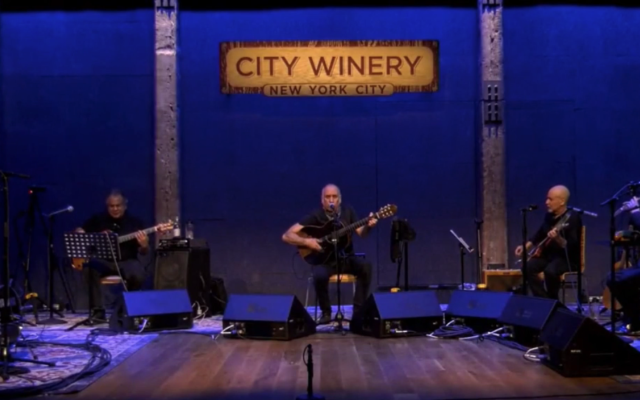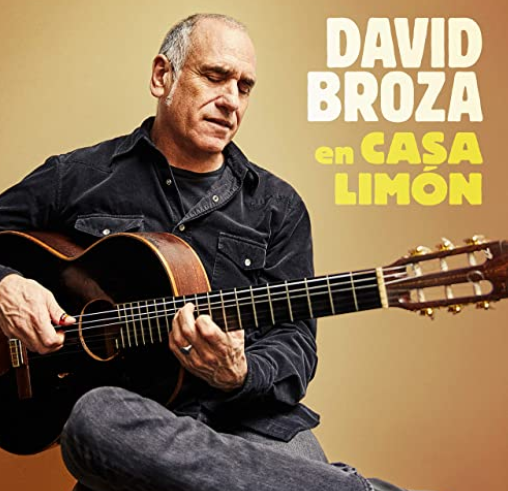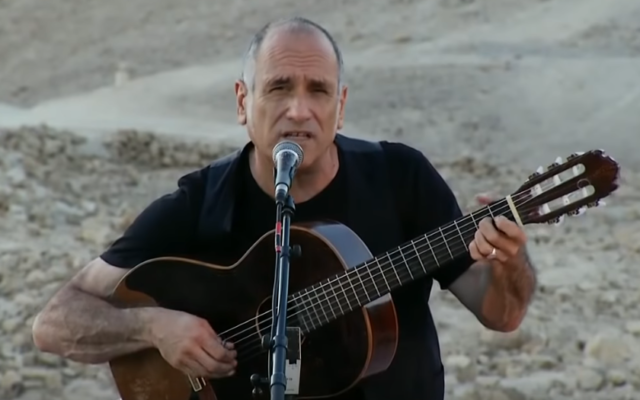David Broza Creates Music for Changing Times
Pandemic has not slowed one of Israel’s most popular entertainers.
While live musical performances took a big hit last year, Israeli born singer and songwriter David Broza has found ways to continue to make music despite the impact of the pandemic.
Just before the year-end holidays he celebrated the 25th anniversary of his “Not Exactly Christmas Show” from the new City Winery in New York to a virtual network of six other City Wineries, including one in Atlanta.
Performance stages in another eight locations across the country also sold tickets to the concert, which attracted several thousand enthusiastic fans of Broza’s Israeli-accented international approach to contemporary music.

Although the concert was marketed in specific cities, anyone, anywhere with an internet connection, could buy a ticket. Broza likes the idea that he can maintain a certain sense of intimacy in a virtual performance, even if the audience is far-flung.
“Every one of the people watching wherever they are, whether in Colombia, whether in Atlanta, whether in Texas, in Israel, Korea, or Malaysia, is connected. I don’t even know where my audience is, but each and every person who watches feels that he’s the only person in the room.”
The livestreaming of performances, he feels, also makes it easier for performers to relax and create a different kind of chemistry that would not be possible if there was a large audience in front of them.
“It’s a lot harder to create that sense of theater because everybody gets intimidated when there are so many people there. My musicians are, after all, shy people at the end of the day. And in a virtual performance there’s nothing to be shy about. They don’t even know who’s watching. You know, they see a camera, two cameras, fine. They are not aware of it. And so it makes it a very unique performance, super entertaining and riveting and light, you know, for everybody.”
During the three-hour performance Broza sang and played nonstop with a group of back-up musicians and dancers from Spain and Latin America.
The infectious, free-wheeling energy of the concert didn’t seem to faze the 65-year-old Broza who reveled in the high level of musicianship and improvisation during the lengthy set.
“It’s just fun to be able to explore this. Can we actually catch everybody like this on their phones and computers, on their screens, in their homes? They buy a $10 ticket. They can have their family members with them – six, seven, eight – to be all watching for the same price.”
That was just the latest effort by someone who has long been one of Israel’s most popular musicians. His popularity is in part a tribute to being a performer who seems to have a genuine knack of incorporating diverse cultural influences and innovative approaches in his work.
Heading into the new year, he has his first purely instrumental album, a CD that pays homage to the influence of nuevo flamenco and the work of some of the genre’s greatest guitarists. It was produced by Grammy award-winner Javier Limon at his studio in Madrid, Spain, where Broza lived with his parents as a teen.

With last year’s thaw in diplomatic relations between Israel and several nations in the Arab world, he saw the opportunity to explore the idea that music can bridge differences and animosities. He produced a virtual concert of his music, performed in Israel’s Negev desert, to promote the idea that music can be a bridge to a more peaceful world.
“A few weeks ago, we went to King Solomon’s mines in the Negev Desert in southern Israel along with Jerusalem’s East West Orchestra. It’s a phenomenal orchestra that’s made up of Jews from North Africa, some Arabs from Israel, and a string section of Russian emigres and young Indian musicians. And we played my music dressed up in Middle Eastern and North African sound. We did livestreaming to the Emirates, Bahrain, Saudi Arabia and the entire Middle East. And it was a blast. It was unreal. It was fantastic.”
Whether in Israel or America, Broza is enthusiastic about the possibilities that are emerging in a world that is still very much in crisis. Music, whether it is performed virtually or in person, he believes, has the power to produce change.
“It’s a no-brainer. It’s just compassion, just bringing down that level of animosity and fear, bringing it down to the level where we can talk to strangers and become best friends, believe it or not, especially if there’s bread to be broken or in a song to be sung. There’s no question in my mind.”




comments